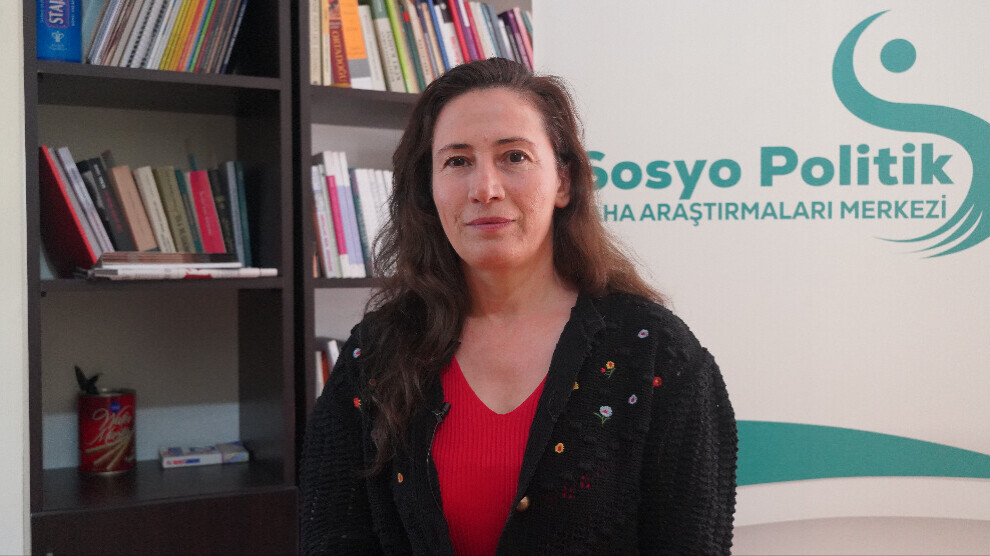Yüksel Genç: The people of Kurdistan are ready for peace
SAMER Coordinator Yüksel Genç said the Kurdish people have welcomed Abdullah Öcalan’s call and are ready for peace, underlining that it is now the government’s turn to act.
SAMER Coordinator Yüksel Genç said the Kurdish people have welcomed Abdullah Öcalan’s call and are ready for peace, underlining that it is now the government’s turn to act.

Yüksel Genç, Coordinator of the Center for Social and Political Research (SAMER), highlighted that the source of public concern regarding the process initiated by Abdullah Öcalan lies with the state and the government. “There is a very strong belief that this process will succeed if the state takes the necessary steps in response to the emerging consensus,” she said.
SAMER conducted a comprehensive field study between March 22 and 26, 2025, in 16 cities of Northern (Bakur) Kurdistan to assess public sentiment following Mr. Öcalan’s call. Speaking to ANF, Yüksel Genç said, “The fact that a message from Mr. Öcalan has been heard and that there is information about how the process is unfolding with a degree of consensus has undoubtedly provided society with a sense of relief in multiple ways.”
Concerns and anxieties
Addressing the presence of concerns and anxieties regarding the resolution of the Kurdish question and the conditions necessary for peace, Yüksel Genç pointed to a cautious approach among the people. She said, “More than 60 percent of the public view Mr. Öcalan’s declaration quite positively, but a significant portion also feels uneasy.”
If the state takes action
Yüksel Genç noted that while the public recognizes that the call alone is not enough to initiate a solution process, there is a strong belief that it can succeed if the state responds to the emerging consensus with concrete action. She added: “Therefore, when no tangible steps are taken by the ruling power and the government public concern over whether the process is proceeding in a healthy manner begins to grow. For example, when people are asked, ‘What should be done first to ensure that this process functions properly?’ the answers primarily refer to the responsibilities of the government and the state.”
General amnesty, the language of peace, and the right to hope
Yüksel Genç emphasized that the ruling power’s discourse and inaction have deeply influenced public perception of the process. She pointed out that the top priorities expressed by participants are telling: “At the top of the list is ‘Above all, a general amnesty must be issued.’ In second place is ‘The government, the opposition, and politicians must abandon divisive and threatening rhetoric and instead adopt a discourse of peace.’ These results show how significantly the lack of initiative and the polarizing language from the government side have impacted public sentiment;
- Nearly 3.5 out of every 5 respondents see a general amnesty as a necessary first step for the process to move forward.
- 3 out of every 5 emphasize that Mr. Öcalan’s participation in the process must be ensured, framing it as part of a ‘right to hope.’
- A similar proportion believe that ill prisoners and those who have been imprisoned for 32 years should be released immediately, and that a cleansing step is needed to help build an atmosphere suitable for peace.
- Nearly 3 out of every 4 participants think that those leading the process and the legal framework securing it must be urgently legislated by the parliament.”
Genç underlined that all of these expectations point directly to the state and the government. She said, “These results show that unilateral efforts are insufficient to bring resolution and peace to the Kurdish question. The Kurdish people are truly ready for a peace process. There is a powerful collective memory of peace shaped by past experiences. People can now voice specific demands and know that these expectations must be directed toward the ruling authorities. According to the Kurdish people, those who are not ready for a peace process, those who do not want a solution process, are the state and government institutions and the segments gathered around the dominant Turkish identity.”
Öcalan’s physical freedom must be ensured
Genç stressed the need to secure the physical freedom of Mr. Öcalan and underlined the importance of urgently bringing the concept of the “right to hope” onto the public agenda. She added: “There is a serious proposal for a path-clearing process that would enable the progress of this initiative, and it must be allowed to develop. Legal regulations and guarantees for freedom of expression and organization must be established. In our research, the percentage of people in Turkey who believe there is freedom of expression and organization does not even reach 10 percent. In a political climate where such freedoms are absent, the conditions for speaking courageously about peace are also absent.”